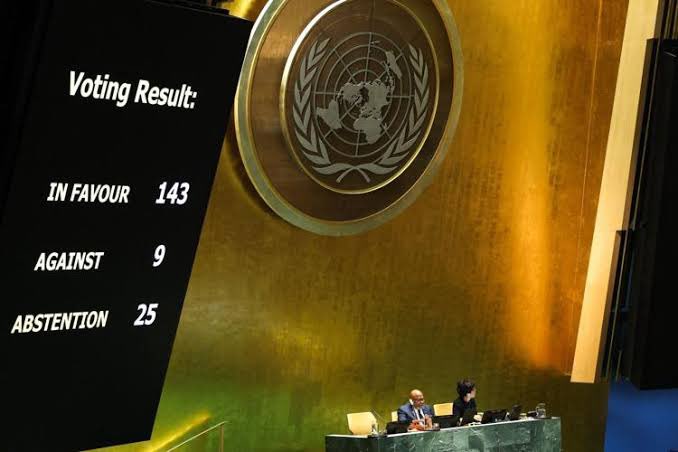IN THE MEDIA
Palestine vote the worst of all worlds for Australia
May 15, 2024 | Colin Rubenstein

An edited version of this article appeared in the Daily Telegraph and the Courier Mail – 15 May 2024
The Albanese Government’s decision to vote in favour of the UN General Assembly’s latest counterproductive upgrade of status for the Palestinian delegation to the UN on Friday was profoundly disappointing.
It’s completely misguided as a way to advance Israeli-Palestinian peace following the current Gaza conflict launched by Hamas’ unprovoked mass pogrom of October 7 last year, and can only undermine our long-standing bipartisan national commitment to a negotiated two-state peace between Israel and the Palestinians.
Foreign Minister Penny Wong insists the fact that the resolution mentioned a two-state resolution made it worthy of support – but this is an absurd rationale. The resolution failed to mention or criticise Hamas or October 7 in any way, or call for the Palestinians to eschew terrorism or negotiate in good faith. Hamas itself welcomed the passage of the resolution – starkly contradicting the Government’s hollow protestations that the resolution hurt Hamas’ interests by calling for two states.
Apart from the fact that ‘Palestine’ clearly does not currently meet the criteria for statehood defined by international treaty law, the preconditions for a two-state Israeli-Palestinian peace are simply not currently in place, and extending recognition to the ‘State of Palestine’ now makes it much less likely these preconditions can ever be put in place.
As Minister Wong correctly said, Hamas must have no future role in governing Gaza, not least because it is irredeemably and militantly opposed to any two-state peace, yet this resolution makes Hamas taking over the Palestinian national movement more likely. There is no doubt whatsoever that many Palestinians see UN recognition of ‘Palestine’ as a major national achievement made possible by Hamas’ wave of barbaric mass violence on October 7. Such recognition thus not only makes Hamas more popular among Palestinians, but also undeniably amounts to rewarding Hamas’ violent, terrorist methods. The world, with Australia’s support, is thus effectively signalling that mass murder, rape, kidnapping, and hostage-taking are acceptable and effective tools for achieving legitimacy and international support.
In addition, extending such recognition now is also a huge disincentive for the Palestinian Authority (PA) – which has rejected peace negotiations for a decade, is rife with corruption and deeply unpopular, and incentivises terrorism – to undertake “the root and branch reforms” our Government has acknowledged it must before it can take over Gaza’s governance post-war, or become the nucleus of a Palestinian state.
Furthermore, the UN General Assembly vote to give the ‘State of Palestine’ status as a member state in almost all respects contradicts the language of the UN Charter – part of a wider pattern whereby the UN has destroyed its ability to be a force for Middle East peace through the extreme anti-Israel bias and partisanship which has dominated that body for decades. This cannot serve Australia’s broader national interests. Yet with this vote, Australia has effectively backed the UN to both discredit itself as a trustworthy custodian of international peace and security and make itself yet more of an obstacle to genuine Israeli-Palestinian peace.
Damagingly to our national credibility, we are also out of step with our key allies. These include the US, Argentina, Papua New Guinea and Czechia, which voted against, and the UK, Canada, Germany, Italy, Sweden, Ukraine, Fiji, and the Netherlands, which abstained, all clearly recognising the very counter-productive effects of this UN resolution.
What’s more, at a time when the Jewish community is looking for government leadership and support in the face of an unprecedented wave of antisemitism in Australia, the Government’s vote – which can only further inflame communal tensions – is particularly concerning.
Moreover, apart from damaging our long-standing bipartisan national commitment to a negotiated two-state peace between Israel and the Palestinians, this UN vote marks a significant break in Australia’s historic record of friendship and support for our democratic friend and ally Israel and its security – as well as undermining Australia’s democratic values and traditions.
Why is the Government making this major shift, and offering such weak justifications for it? It seems difficult to avoid the conclusion that domestic political calculations played a far more important role than thoughtful or principled statesmanship.
Meanwhile, predictably, a policy of serial appeasement of pro-Palestinian demands has done little more than move the goalposts for the maximalist pro-Palestinian faction within the ALP and the pro-Palestinian lobby more generally – herding the party leaders towards the abyss of total irrelevance on this issue, and further damage to Australia’s essential national interests.
For example, when Wong asserted in a recent policy speech at ANU “any future Palestinian state cannot be in a position to threaten Israel’s security and will need a reformed Palestinian Authority,” the head of the Australia Palestine Advocacy Network disrespected her, saying her statement “reeks of some sort of colonialism.”
The short-sighted, confused and counter-productive policy approach that we have seen from this Government toward Israel, the Palestinians and the current war in Gaza amounts to a dangerous game of partisan politics that damages Australia’s national interests and undermines long-established bipartisan national goals for the Middle East. The Government needs to urgently reconsider.
Dr. Colin Rubenstein is Executive Director of the Australia/Israel & Jewish Affairs Council (AIJAC).
Tags: Australia, Israel, Palestinians, United Nations





